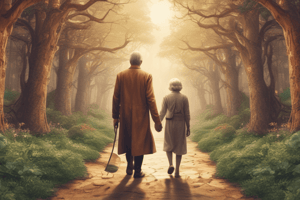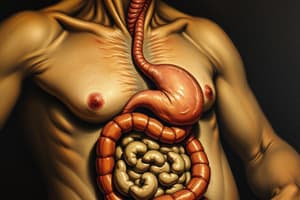Podcast
Questions and Answers
What cellular component is theorized to accumulate and cause aging, according to the cross-linkage theory?
What cellular component is theorized to accumulate and cause aging, according to the cross-linkage theory?
- Cross-linked proteins (correct)
- Free radicals
- Damaged DNA
- Excess lipids
Which biological process is directly impeded by the accumulation of cross-linked proteins, contributing to the effects of aging?
Which biological process is directly impeded by the accumulation of cross-linked proteins, contributing to the effects of aging?
- Waste removal
- All bodily processes (correct)
- Protein synthesis
- Cellular respiration
If a researcher aims to study the impact of cross-linked proteins on tissue elasticity, which of the following methods would be most appropriate?
If a researcher aims to study the impact of cross-linked proteins on tissue elasticity, which of the following methods would be most appropriate?
- Counting mitochondria in cells
- Analyzing protein structures in tissue samples (correct)
- Monitoring glucose metabolism
- Measuring enzyme activity in cells
According to the cross-linkage theory, what is the relationship between the quantity of cross-linked proteins and aging?
According to the cross-linkage theory, what is the relationship between the quantity of cross-linked proteins and aging?
A pharmaceutical company is developing a drug to reduce the effects of aging by targeting cross-linked proteins. Which mechanism of action would be most promising for such a drug?
A pharmaceutical company is developing a drug to reduce the effects of aging by targeting cross-linked proteins. Which mechanism of action would be most promising for such a drug?
What is the primary implication of a cell's limited replicative capability according to the text?
What is the primary implication of a cell's limited replicative capability according to the text?
If a species-specific biologic clock is estimated at 110 to 120 years for humans, what does this suggest about life expectancy?
If a species-specific biologic clock is estimated at 110 to 120 years for humans, what does this suggest about life expectancy?
How does the concept of a 'biologic clock' influence our understanding of aging?
How does the concept of a 'biologic clock' influence our understanding of aging?
Why is understanding the cell's replicative capability important in the context of human aging?
Why is understanding the cell's replicative capability important in the context of human aging?
If researchers discover a method to significantly extend a cell's replicative capability, what would be the most likely impact on the understanding of human aging?
If researchers discover a method to significantly extend a cell's replicative capability, what would be the most likely impact on the understanding of human aging?
Flashcards
Cell Replicative Capability
Cell Replicative Capability
The maximum number of times a cell can divide before it irreversibly stops.
Cell Aging
Cell Aging
The process through which cells lose their ability to divide and function optimally over time.
Human Aging
Human Aging
The natural biological process of getting older, linked to cellular changes.
Life Expectancy
Life Expectancy
Signup and view all the flashcards
Biologic Clock
Biologic Clock
Signup and view all the flashcards
Cross-linked proteins
Cross-linked proteins
Signup and view all the flashcards
Cell damage
Cell damage
Signup and view all the flashcards
Aging process
Aging process
Signup and view all the flashcards
Bodily processes
Bodily processes
Signup and view all the flashcards
Theory of aging
Theory of aging
Signup and view all the flashcards
Study Notes
Theories of Aging
- Aging is defined as the progressive loss of function. The exact cause is unknown, but it's a multifactorial process, involving genetics, diet, and environment.
Biological Theories of Aging
- Examines the basic physiological processes in living organisms over time.
- Key concepts include free radicals, oxidative stress, cross-linking and telomere shortening.
Psychological Theories of Aging
- Examines how individuals respond to the tasks and roles of different ages. Influenced by both biology and sociology.
Social Theories of Aging
- Focuses on the roles and relationships of individuals in later life.
Biological Aging Theories
- Organs age at different rates within an organism. Degradation may occur at the organ or system level.
- Free radical theory: suggests that free radicals, unstable atoms, damage biological molecules. These radicals are byproducts of metabolic activity. Environmental pollutants such as ozone, pesticides, and radiation increase free radical production. Antioxidants neutralize free radicals, or inhibit their production.
Free Radical Theory
- Unstable atoms, called free radicals, quickly react with compounds to gain stability. They often take electrons, forming more free radicals and causing damage.
- Oxidative stress: results from excess free radicals leading to biochemical damage to cells.
- Lipofuscin: a lipid and protein-enriched, pigmented material found accumulating in older adults. Considered an indicator of aging, it disrupts oxygen and nutrient supply, leading to tissue damage.
Cross-linking Theory
- Irreversible aging of proteins, such as collagen.
- Accumulation of cross-links between proteins leads to loss of elasticity, stiffness, and eventually loss of function in tissues and organs.
Hayflick Limit Theory
- Normal human cells can only replicate and divide a limited number of times (40-60) before programmed cell death (apoptosis). The limit is linked to telomeres, protective caps at the ends of chromosomes that shorten with each division. Decreased telomere length is associated with aging.
Immunologic Theory
- The immune system becomes less effective with age, reducing protection against diseases.
- Immunosenescence: age-related decline in immune function. This causes a decrease in resistance to infection and an increase in autoimmune responses.
Endocrine Theory
- Proposes that hormone production changes as a result of aging in the hypothalamus and pituitary.
- Levels of several hormones may decrease, affecting organ systems and functions.
Wear-and-Tear Theories
- Body systems wear out over time, leading to aging.
- Continuous use and exposure to stressors lead to damage and aging.
Person-Environment Fit Theory
- Individuals adjust their competencies to better meet the challenges of the environment as they age.
- Environment becomes more threatening or difficult to manage, causing individuals to feel less competent.
Sociological Theories of Aging
- Activity Theory: individuals need to remain active to age successfully.
- Continuity Theory: individuals will respond to aging with the same habits, and attitudes that were present in previous life stages.
- Age stratification Theory: societies of cohorts/groups that age collectively. Older individuals influence and are influenced by, other cohorts and societal processes.
Implications For Nursing
- Nurses must consider individual needs and responses to aging.
- Interventions should focus on maintaining and enhancing quality of life.
Studying That Suits You
Use AI to generate personalized quizzes and flashcards to suit your learning preferences.




